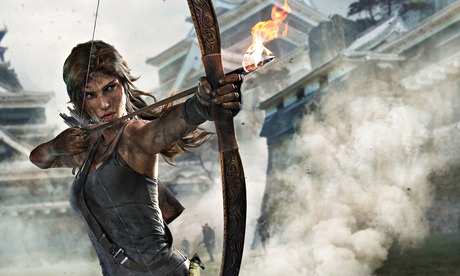
I grew up at a time when gaming was peripheral, and it suited my view of myself. But as I get older it's becoming more and more clear to me how fortunate and privileged I am in my public voice, and also how far game is from the cultural underdog I projected it to be.
It began last year with GTA5. Rockstar's wildly veering juggernaut careered down main street, piling through its pedestrian detractors, and won the title of the world's most successful entertainment release 2013. At the same time, demonstrators in San Francisco began smashing bus windows in protest at the gentrification of the tech-boom area. Google itself became known less for its slogan, "Don't Be Evil", as for buying up surveillance and military robot companies. And back at home, those of us who had always loved games unwrapped GTA5 and began playing with excitement, pride and gradual, creeping horror.
It's not nice to feel you're on the wrong side. For me, game had always been a place for outsiders to call home. GTA disabused me of this. It felt like where you came to be one of the dicks. I enjoy defending game from its laziest detractors and I believe in its future as an artform. But without an acknowledgement of the hubristic complacency and aggressive homogeny at the centre of the tech industry, I fear its most inspiring mainstream works will never come.
I've written for games a little and I've been shocked at how overwhelmingly male and overwhelmingly white it is. Really, blazingly, Apple-product, light-bouncingly white (and I say that coming from theatre). Should it matter? What is the issue with power and money being located and multiplied among the same group over and over?I believe broadening the industry is artistically valuable, economically profitable and most importantly, right.
Last year, women made up almost half of the gaming audience and only around 5% of games' protagonists (acknowledging that 40% of games have genderless protagonists). That's still weird. Ethnic diversity statistics are even harder to find, mirroring workforce diversity statistics from within tech companies which they refuse to give out.
Of course there are steps forward in mainstream games. I'm enjoying The Walking Dead: Episode 2, which has always featured interesting, well-written central characters of colour. And like the excellent Last of Us: Left Behind, TWD is handing off from the paternal male protagonist's viewpoint to that of the young girl he used to protect. This isn't entirely surprising. Culturally, we have always been more comfortable with little girl protagonists (Alice in Wonderland, The Wizard of Oz, The Lion, the Witch and the Wardrobe), accepting a combination of courage and vulnerability in them that we refuse adult female creations.
The exception to this is the excellent Tomb Raider, which has recently received a definitive edition release. It has one of the best written scripts around by Rhianna Pratchett. The game has the courage really to show what it might feel like to fight for one's life marooned on an island. It explores the mindset required to overcome seemingly impossible obstacles. And it can do this because its script expresses her fear in order to have her conquer it. Fear's an emotion often denied male protagonists because of our refusal to conflate masculinity and vulnerability. This is just one example of how broadening the scope of who builds and features in mainstream games makes them better, not just different.
The dominant contemporary solution to these homogeneity problems is expressed in Sheryl Sandberg's book Lean In (just sold to Sony in a major motion picture deal). It basically encourages the rest of us to try harder. It advocates stepping further towards the mainstream, further into it, becoming more like the thing that is excluding you. I've sat around glass conference tables as the only woman and been tempted to lean. It's thrilling as well as pressurising to feel important yet different, to speak for "women" in a room (after all, who will contradict me?) It's also totally, devastatingly false. And dangerous, as bell hooks has brilliantly outlined.
I can't speak for women of different socio-economic backgrounds, older women, women of colour. By leaning in to a dominant system, fitting in too far, I eventually barely even speak for myself. I speak for the system.
But some women in tech are choosing to do the opposite, opting instead to, ''lean out'' to work and create.
One of those is Shanley Kane, who along with Amelia Greenhall, left the mainstream tech industry last year to found Model View Culture, a media company providing writing about technology, culture and diversity with a site as crisp and clean as the prose it contains.
Kane is an impressive, passionate writer and entrepreneur who addresses inequalities in the tech industry accurately and without apology. "While many groups in technology ARE under-represented, we are here, have always been here and are doing amazing things," Kane writes. "Changing the tech industry from within can be extremely challenging – questioning and critiquing the status quo can really endanger your job and career."
I believe we can do better than mainstream releases like GTA5 in terms of character, story and heart. I believe listening to original voices such as Christine Love and Mattie Brice is an essential part of that. I cannot wait to see what we can do as an industry on the brink of such creativity and power. But let's remember where we came from, those who felt ostracised by the mainstream. Let's recognise that the refusal of the industry to disclose any diversity statistics is telling and damning. Let's encourage all who might experience "imposter syndrome" to feel their perspective is more valuable because it has so far remained unrepresented, not less. When I asked Shanley Kane what she was afraid would happen in the future in tech, she answered with more hope and insight than any futurologist. She replied simply: "I'm not afraid."

